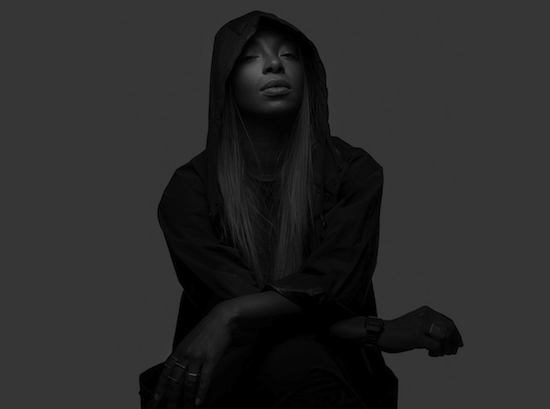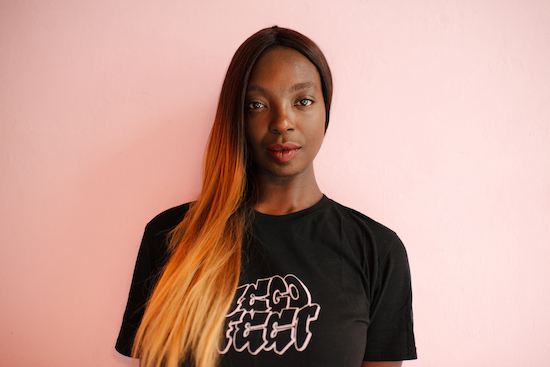This Friday (October 29), BBC Radio 3’s Unclassified programme comes to the Southbank Centre’s Queen Elizabeth Hall for a special event.
Aïsha Devi, Daniel Avery and Afrodeutsche have written and arranged brand new music for the BBC Concert Orchestra to perform, with Devi and Afrodeutsche also appearing onstage to contribute live electronics and vocals. The orchestra, meanwhile, will be conducted by Andre de Ridder, a collaborator of Damon Albarn, These New Puritans and Arcade Fire. co-curated by Andre and Radio 3 host Elizabeth Alker.
Below, BBC Radio 3 host Elizabeth Alker, who has co-curated the event alongside de Ridder, speaks to Afrodeutsche (real name Henrietta Smith-Rolla) about her piece, Promises, which has been written as a suite in three movements. It was put together in response to her experience of racism following Bukayo Saka, Marcus Rashford and Jadon Sancho’s missed penalties during this year’s UEFA Euro 2020 final.
Tickets for this Friday’s concert featuring Aïsha Devi, Afrodeutsche and Daniel Avery performing with the BBC Concert Orchestra are available here. Unclassified, presented by Elizabeth Alker, is broadcast on BBC Radio 3 every Thursday at 11:30pm GMT, and it’s available any time via BBC Sounds here. Afrodeutsche has a new radio programme, The People’s Party, starting on October 29, which will air on BBC Radio 6 Music.
Tell us about the piece; how did it start and how did it come together for this commission?
Afrodeutsche: I was stuck when you asked me to do this. I was a bit overwhelmed because it was such a blank canvas. It took me about a week to put the whole project together in Ableton because the orchestra is so huge. But then I started to write the actual music around the time of the Euros, which was such a difficult time. I was in bed and I saw on the news that those penalties had been missed. My heart just sank and I knew what was coming. Being a Black human being and growing up in the UK, racism is always something that I’ve lived with. But it’s only recently that racism has been so obvious in the media. I had a lump in my throat for weeks and weeks. The weight of racism was everywhere. My best way of dealing with a lot of emotional stuff is to write music, that’s how I process these things. So writing this piece was a real blessing because it was an instant way of being able to move that pain.
I started to think about songs people sing at football matches and those words, ‘who’s army’, really stuck out. I took that phrase and used it in the piece and I’ll be singing those words live on Friday.
I was also at a point where I was rediscovering my faith. It seemed to all point towards the war that we’re in, and how challenging and spiritual that is. But also, we’re not alone in that fight. That was the relief. And it was why I was able to write about this because I knew I wasn’t alone.
Tell us about the title, Promises
A: Promises comes directly from my belief in the promises of God. I didn’t have the title until after the piece was finished. It was a process of going into my faith and the language of that, so there is scripture in there too. When it all came together, I realised that the piece is really about His promises, that He will not lie, He cannot lie, and He won’t let us go. So, it became about that realisation. He will always provide what you need. The lyrics in the second movement are, ‘He promises to answer the cry of your heart’. That’s where the core message really landed for me.
What can we expect from the performance?
A: I really wanted to play with the room so the piece is written in a way that it moves across the orchestra. I felt that by trying to achieve that, I’d give myself some real parameters, a real structure to work within. As I say, I was feeling overwhelmed by the infinite options that come with working with an orchestra this size. I had a picture of the orchestra in front of me in the studio and I just moved the parts through instruments that were in certain sections so the music kind of sweeps across the room.
The first movement is very traditional. I wanted to do something that I imagined people weren’t expecting. I’m an electronic music artist but that movement is completely acoustic. As the piece develops, I introduce vocals and then for the finale we introduce electronics alongside vocals and it ends at 160 BPM! I’m really pushing it. There’s real urgency. And there are so many layers. Layers of vocals, layers of drums. The full orchestra is playing at this point.
I feel as though I’m working with the conductor and sound-engineer in a kind of trio. We’ve got three different click tracks and cues – one for the conductor, who will signal to the orchestra of course, one for me and the sound engineer to know when to trigger the electronics, and one telling me when to sing. I’ve got some five-part harmonies going on, so it’s a real balancing act. We’ve got an engineer who really understands this room, which was ultimately built to amplify sound.
What was it like to have two completely different ways of writing music working in tandem in your mind? How did you think about bringing electronic and orchestral music together?
A: It’s so interesting that this project came about when it did because I’d already been working towards putting these two worlds together. In January 2020, with my live show, I opened the CTM Festival at Berghain in Berlin with my requiem Amt der Seele, which translates as ‘office of the soul’. I’d decided that I wanted to sing and play piano live and bring those two elements together with electronics. Afterwards, wandering round Berghain, people were coming up to me to say they’d felt a real freedom in the room and that they’d felt like crying. It was the first time I’d felt confident mixing acoustic instruments and my voice with electronics. So it was something that was brewing, and that experience nourished and grew those skills and that whole process really helped me write this piece.

How does it feel to be sharing the Unclassified Live lineup with Daniel Avery and Aïsha Devi?
A: It’s a real joy to be on the line-up with Daniel and Aisha. Just before the pandemic, I met Daniel Avery in Paris because we’d both played a show there. I was really intrigued by his work and found him to be a really gentle soul. I’d wanted to spend more time talking to him but the pandemic meant those conversations didn’t happen. So, when I saw he was on the lineup for Unclassified Live, I thought, ‘How brilliant, now I get to hear more of his perspective on making this sort of music and in this environment’.
With Aïsha, we’d had lots of shows in the same cities at the same time but our paths never crossed. Then after one show in Sheffield, we were both leaving the hotel and we didn’t get to speak but there was a knowing nod across the car park as if to say, ‘Hi, I’d love to engage with you even though it’s not happening right now’. So I’m really excited to see what she’s doing. I know she has a really unique approach to her music so I can’t wait to see that and hear more about it.
How important is it to work across disciplines and seek opportunities to collaborate with artists from different backgrounds?
A: It is so important to bring artists of different disciplines together. Working with musicians from different backgrounds helps you understand the level of artistry that is involved in making music. Everyone has their own process, whether they are self-taught or have a formal music education. We all lift and nurture each other. These collaborations and these moments when industries collide, something really special happens. There’s development because ideas or points of view are changed or shifted. It makes everyone in that situation grow. It’s also so unpredictable. Who knows where you might go when you have a collaboration, and that’s what’s so brilliant.


